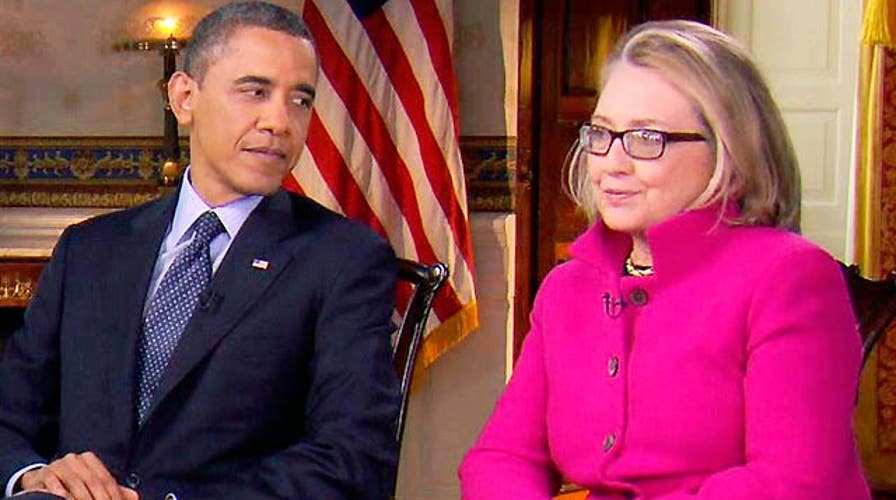This is a rush transcript from "Special Report," January 28, 2013. This copy may not be in its final form and may be updated.
BAIER: OK, part of the "60 Minutes" interview there. We were going to show you some of the tough questions.
(LAUGHTER)
BAIER: We couldn't find that tape. The other interview that got a lot of attention was New Republic, President Obama talking to the New Republic. Here's a quote, "One of the biggest factors will be how the media shapes debates. If a Republican member of Congress is not punished on Fox News or by Rush Limbaugh for working with a Democrat on a bill of common interest, then you will see more of them doing it...The same dynamic happens on the Democratic side. I think the difference is just that the more left-leaning media outlets recognize that compromise is not a dirty word."
We're back with the panel. OK, Jonah, your thoughts?
JONAH GOLDBERG, AT LARGE EDITOR, NATIONAL REVIEW ONLINE: Starting with the "60 Minutes" interview, I think it was a grotesque embarrassment for CBS News. I think that this is the kind of thing -- this is the People Magazine-ification of "60 Minutes," which historically was always the news program that politicians were supposed to be most scared of. It is inconceivable that any of the journalists at Fox, if they had gotten an interview with George W. Bush and Condoleezza Rice or Colin Powell, would have gone nearly, remotely same zip code as soft as "60 Minutes" did.
The New Republic had more of an excuse. They are a flagship liberal publication. But it's funny, this editor of the New Republic, Chris Hughes, who is a dot-com millionaire and a donor that used for Obama. He says in his letter to readers in the new issue, in the same issue that has this interview, he says how they are going to have no partisan bias, that they are not going to push a party line, that they are not going to be biased toward a group or one party. And yet, this thing was basically dictation from the President of the United States.
BAIER: Mara?
MARA LIASSON, NATIONAL PUBLIC RADIO: I think that, you know, Chris Hughes is going to have to prove that. And right out of the gate he did an interview with the president and he is a big donor and a former employee. It seemed weird and full of conflict.
The Steve Croft interview, what I thought was so interesting when you hear him asking that question, why did you want to do this? I could almost see the thought bubble over his head -- why did I agree to do this? Because it was kind of a tough piece exit interview pat on the head for Hillary. And he played along from what we can tell.
BAIER: Exit interviews are one thing. At the end of two terms, looking back over two terms, that's one thing. I've done one of those. And you ask certain kinds of questions, reflective. The president starting a second term in the middle of controversy, the secretary of state has just come off controversial testimony on Capitol Hill. There are hot spots all over the world. There are a few questions to ask that probably could be a little bit more pointed.
LIASSON: When you think of all the things that, yes, all the ground that wasn't covered, whether it was Syria or Benghazi or, for that matter, the budget battle. We haven't heard them say anything about that and I'm dying to hear what he has to say. But I guess he is having a second honeymoon.
CHARLES KRAUTHAMMER, SYNDICATED COLUMNIST: I love to hear the president whine about Fox News and talk radio. I think we should be proud of the fact that we annoy him so much. Obviously, if you look at the lineup on one side, the liberals -- the liberal media, you start with ABC, NBC, CBS, CNN, PBS, MSNBC, the elite newspapers, the one remaining news magazine, the universities, Hollywood, it doesn't stop anywhere. On the other side, talk radio, Fox News. And they can't stand the fact that they no longer have a monopoly.
So I think it ought to be taken as a compliment. What I've always said about Roger Ailes and Rupert Murdoch, their genius was understanding and locating a niche audience in broadcast cable news, which is half the American people, the half that have suffered for decades by the fact you get news presented from a single perspective over and over again. And finally, the fact that there is a new perspective, talk radio and Fox, and they can't stand it, a source of pride, I would say.
BAIER: Does this hurt "60 Minutes"?
KRAUTHAMMER: Probably not because it will be sloughed off as just another softy. But I think if you are Al-Ahram, the semi-official paper in Egypt and you had an interview like this with the president you would be embarrassed.
GOLDBERG: I think that's – I think that's right. It's an amazing thing. You have corporate executives, rich people, rich liberals who look at the landscape of the American television, and the response was, you know what we really need is a network to the left of MSNBC. And so Al Gore created Current, which is now Al Jazeera. There is this really other worldly view in the mainstream media.
BAIER: That is it for the panel. But stay tuned to see a true test of trust.
Content and Programming Copyright 2013 Fox News Network, LLC. ALL RIGHTS RESERVED. Copyright 2013 CQ-Roll Call, Inc. All materials herein are protected by United States copyright law and may not be reproduced, distributed, transmitted, displayed, published or broadcast without the prior written permission of CQ-Roll Call. You may not alter or remove any trademark, copyright or other notice from copies of the content.

